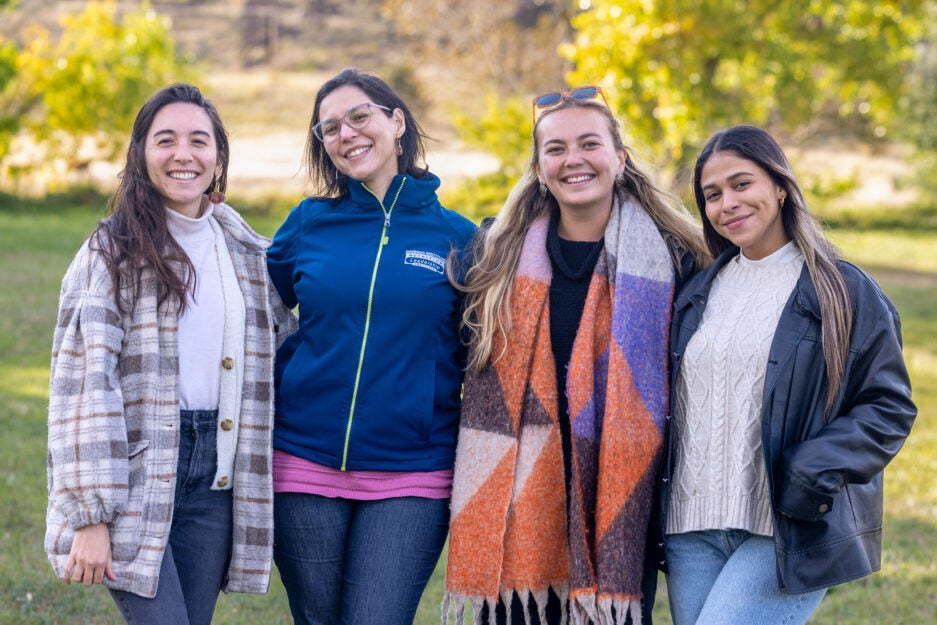Pictured above: Abrania (left), and the La Cajita Mutua (The Collective Box) Project Team
“El pan es el alimento del cuerpo; pero la libertad es el pan del alma.”
Bread is the nourishment of the body; but liberty is the bread of the soul.
– Luis Muñoz Rivera
Let us tell a story—a story of a public health practitioner. A story of a scientist.
A story of a girl from an island.
As a newly minted public health researcher, the girl began work, finally and in earnest, on a research study that had been years in the making. The project had a well-defined exposure—a community-based intervention, grounded in robust scientific evidence and, on the ground, co-designed with well-established partnerships. The project also had a well-defined outcome—food security, whatever she and the academy had decided that meant. And the project had a well-defined setting—an island.
She had done her due diligence. She had worked with this community and in this context for several years. She had challenged her academic efforts to remain engaged, generating knowledge not only for its own sake but for the sake of those most harmed by the determinants of disease and death in that particular community. Her community.
For she was of the community where the project would be carried out, whatever that meant. She was born and raised there, so perhaps a geographic and relational definition. It was where her family was from. It was where she went when she went home.
But the girl recognized the limitations of her perspectives, the dangers of thinking she knew better because of who she was or where she had come from. She was wary of the unknown and, worse yet, fearful of the inescapable enemy of knowledge—that she did not know what she did not know.
So, the best she could do, she thought, was to listen in this new research endeavor. She knew her story, and the stories suggested by the academic literature, about what caused food insecurity on her island. But she knew that knowing these particular stories was not enough.
Because stories, what they do in their essence, is make meaning of what had, before their narratives, seemed like an unintelligible cluster of people, places, and events. Stories are constellations superimposed on otherwise independent stars. They are linear models drawn against data points. They help us make sense of the world and, in the process, can create truth and beauty, or lies and ugliness, or, perhaps, a strange mixture of both.
To listen meant to let someone else tell their own stories, draw their own lines.
So, the girl listened and heard—in this story, in this place, and with these people, at least—that food sovereignty meant far more than food security. Food security was blind to who, in what place, and with what power food was being produced. Food security seemed only to care about whether mouths were fed or, more remotely, whether food was at least available, regardless of whether or not it was actually accessible by all.
She heard that food security crafted its own demise, because it held hands with policies incentivizing the wrong things—food that was not food and farms that were not farms, resembling something closer to products and factories than plants and ecosystems. She heard that food security overgeneralizes, saw the island as a single, vulnerable entity and not as multiple and diverse sets of food systems, each with their own landscapes and challenges. Each with their own stories.
In listening, she recognized that it was these stories—and their formidable power—that could enable a redistribution of power in the scientific process, away from evidence-based assumptions and towards an evidence base built on local priorities and expertise.
To tell the story was to limit herself to what she knew; to listen to and uplift others’ stories was to liberate truth-seeking and allow it to take on far more powerful forms.
The ending of this story is the beginning of a new one. It has meant a deeply critical, reflexive, and conscientious effort to reconceptualize her “food security” work, whatever that means, as an effort that centers storytelling in public health research.
It is a story that, like most science, really has no beginning or end—just messy in-betweens, interspersed by clarifying rays of light.
Abrania Marrero, PhD, SM is a postdoctoral research fellow in the Department of Nutrition and a Community Engaged Learning Pedagogy Fellow with the Office of Education at HSPH. As part of her ongoing work, she is incorporating storytelling as central to the pedagogy and practice of serving learning. By emphasizing the importance of stories, she hopes to ensure that central tenets of community engagement (including considerations around power and positionality), while beginning as interior reflection, are transformed, slowly and iteratively, into an outward-moving, collaborative, and redistributive process of knowledge generation.
